|
|
|
Sort Order |
|
|
|
Items / Page
|
|
|
|
|
|
|
| Srl | Item |
| 1 |
ID:
120283
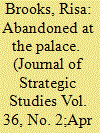

|
|
|
| 2 |
ID:
120295
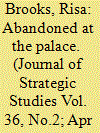

|
|
|
|
|
| Publication |
2013.
|
| Summary/Abstract |
Many analysts have focused on the Tunisian protests and the economic and political grievances that fueled them. Equally central, however, was the role played by the military leadership and the decision to forgo using force to actively suppress the protesters. Contrary to arguments that stress the reflexively apolitical or professional nature of the military, or its leaders' normative commitment to supporting the protesters, this article explains how the decisions made reflected political calculations and served the military's organizational interests. Although heralded as the savior of the revolution, the Tunisian military acted out of its own organizational self-interest in defecting from the Ben Ali regime.
|
|
|
|
|
|
|
|
|
|
|
|
|
|
|
|
| 3 |
ID:
076994
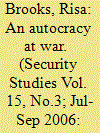

|
|
|
|
|
| Publication |
2006.
|
| Summary/Abstract |
In the June 1967 Arab-Israeli War, Egypt shocked the world with its atrocious performance in battle, only to stun the world again with its remarkable military turnaround in the October 1973 war. Existing studies, which emphasize culture, social structure, and regime type, have a difficult time explaining why this single autocratic state, in such a short period of time, exhibited such extremes in its military competence. None can explain both why Egypt performed so poorly in 1967 and improved so significantly in 1973. Other explanations such as military strategy and learning explain the puzzle in part, but they alone cannot account for the outcome. This article presents a theory that accounts for the divergence in effectiveness, focusing on underlying differences in the fabric of the autocratic regime. It argues that changes in the balance of civil-military power in the state - born from more fundamental differences in domestic politics in the autocracy - shaped three areas of military activity critical to military effectiveness: strategic assessment, command, and control, and leadership. In developing this argument, the article both contributes to growing scholarship on the sources of states' military effectiveness and explains why Egypt's performance varied so significantly in these historically consequential wars
|
|
|
|
|
|
|
|
|
|
|
|
|
|
|
|
| 4 |
ID:
193056
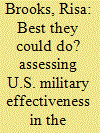

|
|
|
|
|
| Summary/Abstract |
This article explores shortcomings in military effectiveness in the war in Afghanistan. It focuses on three sets of problems: the failure to resolve internal contradictions in the training effort, the failure to integrate political considerations with military activity, and poor strategic and operational/tactical integration.
|
|
|
|
|
|
|
|
|
|
|
|
|
|
|
|
| 5 |
ID:
188215
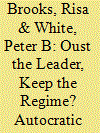

|
|
|
|
|
| Summary/Abstract |
We present a theory for how variation in autocratic civil-military relations affects the type of coups to which autocratic leaders are vulnerable. Dictators rely on alternative strategies of control that involve tensions across two imperatives—governance and coup prevention. In a “grand bargain,” leaders cede prerogatives to the military and compromise on the governance imperative. This insulates them from regime-change coups but still renders them vulnerable to reshuffling coups that result from bargaining failures. Alternatively, political leaders may rely on “containment,” in which they marginalize the military. Although they make fewer concessions on the governance imperative, the military is more likely to oust the entire regime when the former has the opportunity to engage in a coup, not just reshuffle the leader. We evaluate this theory using within-case process tracing and paired case studies of Tunisia and Egypt, and conduct descriptive quantitative analyses to demonstrate the generalizability of our theory.
|
|
|
|
|
|
|
|
|
|
|
|
|
|
|
|
| 6 |
ID:
174115
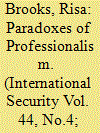

|
|
|
|
|
| Summary/Abstract |
The U.S. military's prevailing norms of professionalism exhibit three paradoxes that render the organization poorly suited to meet contemporary challenges to its nonpartisan ethic, and that undermine its relations with civilian leaders. These norms, based on Samuel Huntington's objective civilian control model, argue that the military should operate in a sphere separate from the civilian domain of policymaking and decisions about the use of force. The first paradox is that Huntingtonian norms, though intended to prevent partisan and political behavior by military personnel, can also enable these activities. Second, the norms promote civilian leaders’ authority in decisionmaking related to the use of force, yet undermine their practical control and oversight of military activity. Third, they contribute to the military's operational and tactical effectiveness, while corroding the United States’ strategic effectiveness in armed conflict. These tensions in Huntington's norms matter today because of intensifying partisanship in society and in the military, the embrace by civilian leaders of objective control and their concomitant delegation of authority in armed conflict to the military, and growing questions about the causes of the inconclusive outcomes of the United States’ recent wars in Iraq and Afghanistan. It is time to develop a new framework for military professionalism.
|
|
|
|
|
|
|
|
|
|
|
|
|
|
|
|
| 7 |
ID:
092891


|
|
|
|
|
| Publication |
2009.
|
| Summary/Abstract |
Strikingly, little systematic study of the relationship between democracy and terrorism has been undertaken. This article addresses this lacuna by laying some groundwork for further analytical study of the issues. It does so, first, by suggesting a family of independent variables related to the concept of political access that might be employed in this research; and second, by introducing a more expansive set of dependent variables, which will help capture the diverse effects of political access on militant group activity. The bulk of the paper examines the variety of causal logics that could potentially connect democracy and terrorist group activity, drawing from five analytical approaches to understanding terrorist motivation evident in the literature. Two major conclusions follow from the analysis. First, the democracy and terrorism debate constitutes not one research question, but many. Second, the prediction that follows from many approaches to terrorist motivation is not that democracy should promote an easy, inevitable lessening of terrorism. Rather, a more refined understanding of when democracy, or other forms of political access, may reduce violence or yield other desirable (and undesirable) outcomes is essential.
|
|
|
|
|
|
|
|
|
|
|
|
|
|
|
|
| 8 |
ID:
183892
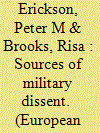

|
|
|
|
|
| Summary/Abstract |
How do militaries push back when they oppose civilian initiatives? This article analyses the sources and character of military dissent, focusing on the United States. It details the sources of military preferences over policy and strategy outcomes, emphasising the interplay of role conceptions with other material and ideational factors. It then presents a repertoire of means – tactics of dissent – through which military leaders can exert pressure, constraining and shaping civilians’ decision-making calculus and the implementation of policy and strategy choices. Empirically, it traces military dissent in the 1990s-era humanitarian interventions; the US's ‘War on Drugs’ beginning in the 1980s; and the Afghanistan surge debate in 2009. In so doing, the article contributes to a broader research programme on military dissent across regime types. It also expands scholars’ understandings of preference formation within militaries and illuminates the various pathways through which military dissent operates and potentially undermines civilian control.
|
|
|
|
|
|
|
|
|
|
|
|
|
|
|
|
| 9 |
ID:
186321


|
|
|
|
|
| Summary/Abstract |
Civilian control of the military is central to the making of security policy, ensuring that civilian officials and the elected leaders that appoint them oversee and decide military affairs. This paper exposes a challenge to civilian control in the United States that originates in the disparaging attitudes military personnel hold toward civilian society. We argue that when military personnel view military culture as superior, they are more likely to view civilian political leaders as illegitimate and in turn to favor actions that undermine civilian control. We develop a typology of civilian control in which military officers can constrain, contest and limit civilian authority. Our empirical analysis provides strong and consistent evidence of the corrosive effects of military superiority on civilian control across three surveys of U.S. military personnel: the 1998-99 TISS survey of 2901 military officers, a 2014 YouGov of 275 veterans, and an original 2020 survey of 770 West Point cadets.
|
|
|
|
|
|
|
|
|
|
|
|
|
|
|
|
|
|
|
|
|